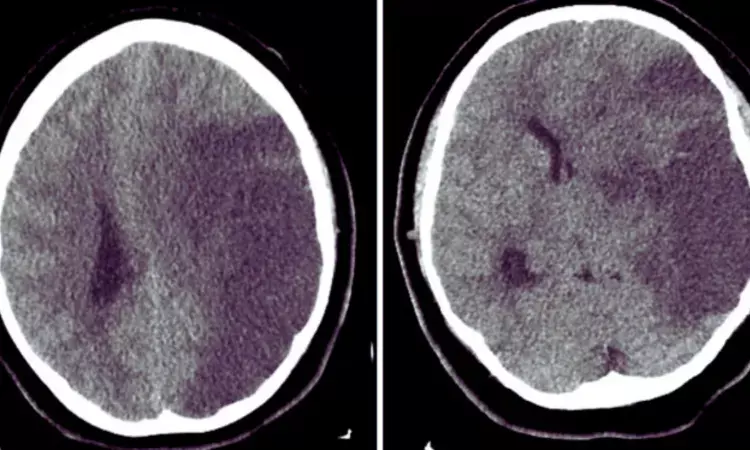- Home
- Medical news & Guidelines
- Anesthesiology
- Cardiology and CTVS
- Critical Care
- Dentistry
- Dermatology
- Diabetes and Endocrinology
- ENT
- Gastroenterology
- Medicine
- Nephrology
- Neurology
- Obstretics-Gynaecology
- Oncology
- Ophthalmology
- Orthopaedics
- Pediatrics-Neonatology
- Psychiatry
- Pulmonology
- Radiology
- Surgery
- Urology
- Laboratory Medicine
- Diet
- Nursing
- Paramedical
- Physiotherapy
- Health news
- Fact Check
- Bone Health Fact Check
- Brain Health Fact Check
- Cancer Related Fact Check
- Child Care Fact Check
- Dental and oral health fact check
- Diabetes and metabolic health fact check
- Diet and Nutrition Fact Check
- Eye and ENT Care Fact Check
- Fitness fact check
- Gut health fact check
- Heart health fact check
- Kidney health fact check
- Medical education fact check
- Men's health fact check
- Respiratory fact check
- Skin and hair care fact check
- Vaccine and Immunization fact check
- Women's health fact check
- AYUSH
- State News
- Andaman and Nicobar Islands
- Andhra Pradesh
- Arunachal Pradesh
- Assam
- Bihar
- Chandigarh
- Chattisgarh
- Dadra and Nagar Haveli
- Daman and Diu
- Delhi
- Goa
- Gujarat
- Haryana
- Himachal Pradesh
- Jammu & Kashmir
- Jharkhand
- Karnataka
- Kerala
- Ladakh
- Lakshadweep
- Madhya Pradesh
- Maharashtra
- Manipur
- Meghalaya
- Mizoram
- Nagaland
- Odisha
- Puducherry
- Punjab
- Rajasthan
- Sikkim
- Tamil Nadu
- Telangana
- Tripura
- Uttar Pradesh
- Uttrakhand
- West Bengal
- Medical Education
- Industry
Hyponatremia Tied to Malignant Brain Edema and Poor Outcomes After Mechanical Thrombectomy in Stroke Patients: Study

China: Recent research published in BMC Neurology has identified hyponatremia, a common electrolyte imbalance, as a significant risk factor for malignant brain edema (MBE) following mechanical thrombectomy (MT) in patients with acute ischemic stroke. The study revealed that in patients with acute ischemic stroke undergoing mechanical thrombectomy, hyponatremia at the time of admission was associated with poorer outcomes.
"These patients were found to have a 3.91-fold increased risk of developing malignant brain edema and were more likely to experience 90-day mortality (odds ratio [OR] 5.49) and functional disability (OR 3.25). Addressing and correcting hyponatremia could help lower the risk of MBE and enhance patient prognosis," the researchers reported.
Hyponatremia, a condition characterized by abnormally low sodium levels in the blood, often results from underlying issues such as heart failure, kidney disorders, or inappropriate antidiuretic hormone secretion and is known to affect brain function. It is also the most frequently observed electrolyte imbalance in stroke patients. Despite its prevalence, limited research has investigated the link between admission hyponatremia and outcomes in acute ischemic stroke (AIS) patients undergoing mechanical thrombectomy (MT), highlighting a critical gap in understanding its impact on this population.
To fill this knowledge gap, Shuang Tang, Neurological Disorder Center, Department of Cerebrovascular Disease, Suining Central Hospital, Sichuan, China, and colleagues sought to investigate the relationship between hyponatremia and clinical outcomes after MT.
For this purpose, the researchers conducted a retrospective study at their center. The primary outcome assessed was postoperative malignant brain edema, while secondary outcomes included 90-day mortality and adverse function, defined as modified Rankin scale scores of 6 and >2, respectively. Patients were categorized into hyponatremia and non-hyponatremia groups based on their serum sodium levels at admission, before any medication use.
MBE occurrence was evaluated through computed tomography after mechanical thrombectomy, and 90-day outcomes were determined through in-person clinic visits or telephone interviews. Multivariate analysis was performed to examine the associations between hyponatremia, postoperative MBE, 90-day mortality, and adverse functional outcomes.
The following were the key findings of the study:
• The study included 342 patients, with 52 (15.2%) identified as having hyponatremia.
• Postoperative malignant brain edema occurred in 86 patients (25.1%).
• Ninety-three patients (27.2%) died within 90 days following mechanical thrombectomy.
• Adverse functional outcomes at the 90-day follow-up were observed in 58.8% of the patients.
• Multivariate analysis showed hyponatremia was significantly associated with:
• Postoperative MBE (odds ratio [OR] 3.91).
• 90-day mortality (OR 5.49).
• 90-day adverse function (OR 3.25).
• Mediation analysis indicated that postoperative MBE partially contributed to the 90-day mortality and adverse function in patients with hyponatremia, with regression coefficients changing by 18.6% and 23.9%, respectively.
The study showed that hyponatremia is a prevalent electrolyte imbalance in acute ischemic stroke patients with large artery occlusion undergoing mechanical thrombectomy. It was identified as an independent predictor of postoperative malignant brain edema, 90-day mortality, and adverse functional outcomes.
"Addressing and correcting hyponatremia may be a viable strategy to reduce the risk of postoperative MBE and improve patient prognosis. However, further experimental research is needed to uncover the underlying mechanisms connecting hyponatremia to these outcomes," the researchers concluded.
Reference:
Qian, A., Zheng, L., Duan, J. et al. Hyponatremia is associated with malignant brain edema after mechanical thrombectomy in acute ischemic stroke. BMC Neurol 25, 41 (2025). https://doi.org/10.1186/s12883-025-04051-5
Dr Kamal Kant Kohli-MBBS, DTCD- a chest specialist with more than 30 years of practice and a flair for writing clinical articles, Dr Kamal Kant Kohli joined Medical Dialogues as a Chief Editor of Medical News. Besides writing articles, as an editor, he proofreads and verifies all the medical content published on Medical Dialogues including those coming from journals, studies,medical conferences,guidelines etc. Email: drkohli@medicaldialogues.in. Contact no. 011-43720751


